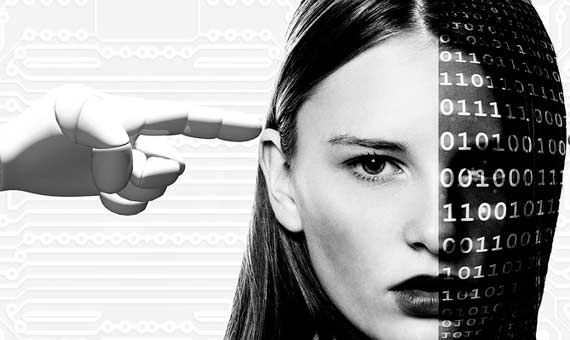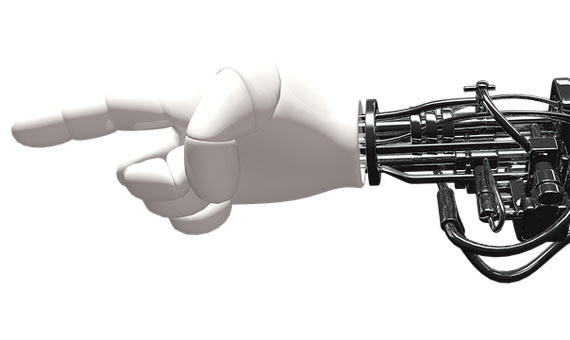They have come to stay. Robots are always in the same mood and 100% willing to work without being aware of how hard it is, and they can be switched on and off. In short, they are efficient and effective at the same time. As a consequence, they are the dream of companies, human resources staff and more. It’s now time to see how we accept this change, create legislation for it and reinvent ourselves.

They first appeared in factories, for instance, to manufacture cars. They clearly freed us from repetitive work in heavy industries; they didn’t have a human shape and, precisely for this reason, we never saw them as a threat. Times have changed and now robots are increasingly more independent and able to learn. And if you want to be romantic, a lot of them look increasingly more human. Seeing them as our equals, as direct competitors, we are perhaps petrified. This is the conclusion of this article in the Spanish newspaper El País:
“Since Humankind became aware of itself, it has designed machines to replace manual tasks. And this process was always seen as freedom rather than imprisonment; or people have simply resigned themselves to the changes. Our life is surrounded by machines, such as the washing machine, which took over somebody’s job. And there are already taxes on these machines, on using them but not on their work. When we set taxes on the work of robots, we are acknowledging them as our equals rather than machines. That’s when robotaphobia comes in. As it happens with xenophobia, it targets what is thought to be different but, deep down, is perceived as equal.”
Repetitive work for robots; creative work for humans
The automation of many common jobs has become a key issue in the present time. This is a challenge that questions economic, social and business structures that many people thought of as untouchable until now. Some sectors still don’t want to hear that machines will end their profession. However, pretending the problem is not there does not seem to be the solution to such a major issue. As early as 2013, Oxford published this study at a time when robots and artificial intelligence (AI) did not make newspaper headlines. This research focused on the 700 most common professions in North America, which can be partially extrapolated to many other countries in the developed world.
The goal was to assess which of these jobs would be done by machines within 10 to 20 years. The study’s findings are self-explanatory: 47% of the jobs were at risk of being automated, especially telemarketers, watchmakers, receptionists, salespeople, fast food cooks and drivers. The report The Future of Jobs by the World Economic Forum (January 2016) reached similar figures. This study forecasts that 7.1 million jobs will be lost over the next few years, predominantly office and administrative jobs. However, jobs are destroyed and new jobs are born. The World Economic Forum forecasts that, between 2015 and 2020, robotics, machine learning, nanotechnology, 3D printing, genetics and biotechnology will create 5.1 million new jobs.
And that’s how we get new professions such as “space tourist guide,” “human body designer” or “virtual environment creator” according to the report Tomorrow’s Jobs by experts at Microsoft and the British consultancy firm The Future Laboratory. But, for the job of creating and designing other employment options (a profession in itself), there are other examples such as Silvia Leal, advisor to the European Commission on digital skills. She adds the following as possible job options: “analytics and programmers of the Internet of Things,” “artificial empathy therapists” and “3D printers.” As for the individual skills that we will need to have as workers in the future, the Marketing and Communication Director of the job search portal InfoJobs, Anna Quintero, is very clear in her latest statements: “being a walking encyclopedia will mean nothing.” Quintero goes on to add: “success will come to people that are able to see the connections between subjects, that are able to work in a team with professionals from other areas and that understand the needs of each project.”
Possible solutions: tax on “electronic persons”?
Although there is currently no official university degree in artificial intelligence therapy, there has certainly always been fear with regard to these potential “electronic persons,” the term proposed by the European Union to mean robots, work colleagues that can work 24/7 and that only need periodic checks to survive.

Since the current circumstances demand action, experts at the European Parliament have already started work on this issue: “robots have left their cages and are among us,” this is only an example of what could be heard in a recent session of the Parliament. The group at the meeting was eclectic and with very diverse opinions: researchers, businesspeople, academics, union leaders, insurers and artists. However, they had a clear goal: to propose large-scale regulations on these electronic devices that we will have to work with “side by side.” Intended to draw up a report, the session focused on two main questions: civil and legal liability of robots; and a possible tax on robots that work (a controversial issue that Bill Gates has brought to the public discussion arena).
Nevertheless, some are of the opinion that robots will do what we humans tell them to do and, as such, we will still hold the control and responsibility.
The solution is coexistence
Joseph Paradiso, a researcher at MIT and author of one of the articles in the book The Next Step: Exponential Life, believes that “creativity is a human capacity that machines are likely never going to be able to fully develop and, as a consequence, one of the areas where there will more job opportunities in the future.”
Another important opinion on this subject, also from one of the authors in the book, is that of Seán Ó hÉigeartaigh, Executive Director of Cambridge University’s Center for the Study of Existential Risk (United Kingdom). In his opinion, “in the future, work will stop defining who you are because people won’t need a senseless job to give their life meaning, especially if it is a repetitive job.”
I wonder if the job we do is actually repetitive or whether we have been able to turn repetition into something creative. But something is clear: they have come to stay and we need to reinvent ourselves, as we have always done. It is a matter of creativity…
Rosae Martín Peña
Comments on this publication